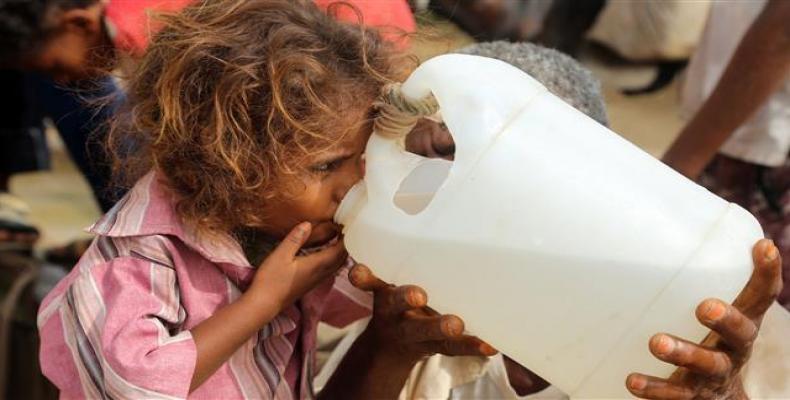Geneva, November 21 (RHC)-- The International Committee of the Red Cross (ICRC) says Yemeni capital of Sanaa and the south-central city of Bayda have joined the list of urban centers without clean water due to a persisting blockade imposed on the impoverished nation by a Saudi-led military coalition.
The ICRC said in a statement that the siege, which halted the import of fuel needed for pumping and sanitation, has blocked the access of some 2.5 million Yemenis to clean water in crowded cities. Geneva-based humanitarian institution’s spokeswoman, Iolanda Jaquemet, said that the lack of access to clean water was “putting them [Yemenis] at risk of another major outbreak of water-borne diseases,” similar to the deadly cholera outbreak that has claimed the lives of at least 2,200 Yemenis since April.
She added that some 940,768 Yemeni people had been infected with the water-borne diseases in the world's worst epidemic in a single year. Jaquemet also warned that other cities of the Arab country “are running out of fuel,” which is necessary to run pumping and sanitizing machines. "The water and sewage systems in Dhamar and Amran are now providing only half the normal coverage,” Jaquemet further said.
Saudi Arabia has been ceaselessly pounding Yemen since March 2015. Latest figures show that the war has so far killed over 12,000 Yemenis and wounded thousands more. The Saudi aggression has also taken a heavy toll on the country's facilities and infrastructure, destroying many hospitals, schools and factories.
To further coerce Yemenis, Riyadh imposed a tight blockade on nearly all Yemeni air, land and sea ports on November 6th, prompting human rights and charity groups to raise the alarm over deteriorating situation in the country as people, particularly children, are increasingly suffering from the lack of food and medical supplies.
Last week, three of the United Nations agencies -- the World Food Program, UNICEF and the World Health Organization -- have made a fresh plea for the Saudi war machine to remove its blockade on the impoverished nation, warning that without aid shipments “untold thousands of innocent victims, among them many children, will die.” They further warned that even if the blockade was only partially removed, an additional 3.2 million people would be pushed into hunger. The trio also said that one million children were at risk of a fast-growing diphtheria outbreak.
Red Cross Says Five Yemeni Cities Left Without Water Due to Saudi Siege

Articles en relation
Commentaires
Laissez un commentaire
Tous les champs sont requisPlus de visites
- Lula rejette le blocus de Cuba au sommet de la Celac et met en garde contre l'ingérence
- La levée du blocus américain contre Cuba est demandée en France
- Le gouvernement guatémaltèque est appelé à rejeter les positions extrêmes interventionnistes des États-Unis à l'égard de Cuba
- L'ambassadeur de Cuba au Venezuela remercie la solidarité internationale avec les missions médicales (+Photo)
- Le président Díaz-Canel rentre à Cuba après avoir participé au sommet de la CELAC au Honduras (+Photo)

